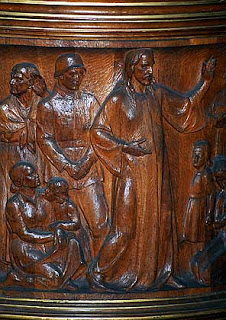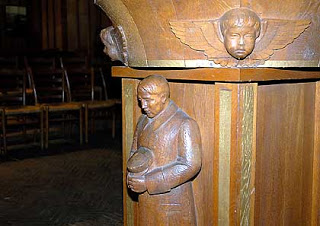The only one present who strongly supported an attack was Martin Bormann, Hitler’s ruthless secretary, who wanted to replace Christianity with a new religion headed by the Fuehrer. Bormann, Rahn told me, turned beet-red with anger as he, the ambassador, made his plea. But Hitler trusted his secretary most, and it appeared that his advice would be taken.
Meanwhile, General Wolff revealed to the Vatican that Pius was in danger. The pope loathed Hitler. And Hitler loathed him, viewing him as an obstacle to his —and Bormann’s—grandiose plan to capture the minds and souls of much of mankind after a victorious war.
In 1939, realizing what was at stake, Pius had actually joined in a conspiracy by some German generals to overthrow Hitler and, if necessary, a high Vatican official told me, to kill him. The risks, he said, to both the pope personally and the Church were incalculable. But in the end the plot fell through.
In 1943, as the tension between the two men grew, Monsignor Domenica Tardini, the Vatican’s assistant secretary of state, told the cardinals to “keep a suitcase ready because we might be deported at any time.” The pope himself called a meeting of cardinals to choose a possible successor in case he was kidnapped. And friends of the pope prepared a plan for him to flee to Spain if necessary, though he vowed to remain in the Vatican unless he was carried out.
Ernst von Weizsaecker, the German ambassador to the Vatican, another anti-Hitler conspirator, tried to convince Pius that he should remain silent when the Nazis rounded up the Jews of Rome. The Pope, until then, had felt that if he spoke out strongly against the Jewish genocide, Hitler would not only attack the Vatican but would drag out the hundreds of thousands of Jews from the Vatican institutions in which they were hiding throughout occupied Europe, as well as their Christian protectors.
But the German diplomats were afraid that he would nevertheless speak out publicly if the Roman Jews, his neighbors, were deported. If he did, they argued, there was virtually no chance that Hitler would cancel his kidnap plan. And on October 16, the Gestapo in Rome began rounding up the Jews.
That rainy morning, Princess Enza Pignatelli Aragona, a friend of Pius, was awakened by a phone call from a friend, who informed her of the arrests. The princess told me she rushed to the Vatican and, interrupting a papal mass, blurted the news to the pope, crying, “Only you can stop them!”
“But they promised me that they would not touch the Jews in Rome!” Pius exclaimed. He then ordered Cardinal Luigi Maglione, his secretary of state, to summon Ambassador Weizsaecker urgently and protest the action. As the princess departed, the pope promised, “I’ll do all I can.”
When Weizsaecker arrived for a meeting with Maglione, he said he would “try to do something for these poor Jews.” But, he asked, “what would the Holy See do if these things were to continue?”
“The Holy See would not want to be faced with the need to express its disapproval,” the cardinal answered …”If the Holy See were forced to
[protest], it would trust the consequences to Divine Providence.” In other words, he would speak out publicly if the roundup of Jews continued.
Shaken, the ambassador responded, “I think of the consequences that a protest by the Holy See might precipitate.”
Clearly, the word “kidnap” was on both their minds.
Meanwhile, other German diplomats—and, the Vatican would say, the pope’s nephew—urged an eminent priest, whom Berlin trusted, to write an urgent note to a cooperative German commander in Italy that was to be wired to Berlin echoing Cardinal Maglione’s warning.
At the same time, in Germany, General Wolff managed to convince Hitler that he would have a hard time suppressing an uprising in Italy if the pope felt forced to speak out and had to be dethroned. So, finally, Himmler ordered that the roundup stop after only about 1,000 of the 8,000 Roman Jews were picked up. And the pope, who had apparently been prepared to publicly condemn the roundup, felt there was no longer a need to do so now.
Several months later, in May 1944, Wolff secretly met with Pius, who, having learned of the general’s role in helping to sabotage the kidnap plot, felt that the man must have some good in him, whatever his background.
Both men agreed that the war would best end in an Allied-German alliance, without Hitler, to halt the Soviet advance on Europe. And Wolff assured the pope that he would try to frustrate any new plot against him.
Wolff was overwhelmed when the pope then blessed him. He now had the full confidence of both the Vicar of Christ and the Antichrist, an incredible interworld feat. The general rose, clicked his heels together—and raised his arm in the Nazi salute! The pope smiled forbearingly. His visitor had simply confused his gods. But he would eventually betray one of them—surrendering the entire German army in Italy, on his own, to the Americans.
The kidnap plot had failed, but it had helped to shape the policies and attitudes of the pope, Hitler, and their subordinates during a most important segment of World War II history.
Award-winning author Dan Kurzman is the only journalist who ever interviewed General Karl Wolff. His newly released book, A Special Mission: Hitler’s Secret Plot to Seize the Vatican and Kidnap Pope Pius XII, is available from Da Capo Press.
Hitler's Plan to Kidnap the Pope
Do they teach anti-Catholic bigotry in your church, Marty?



